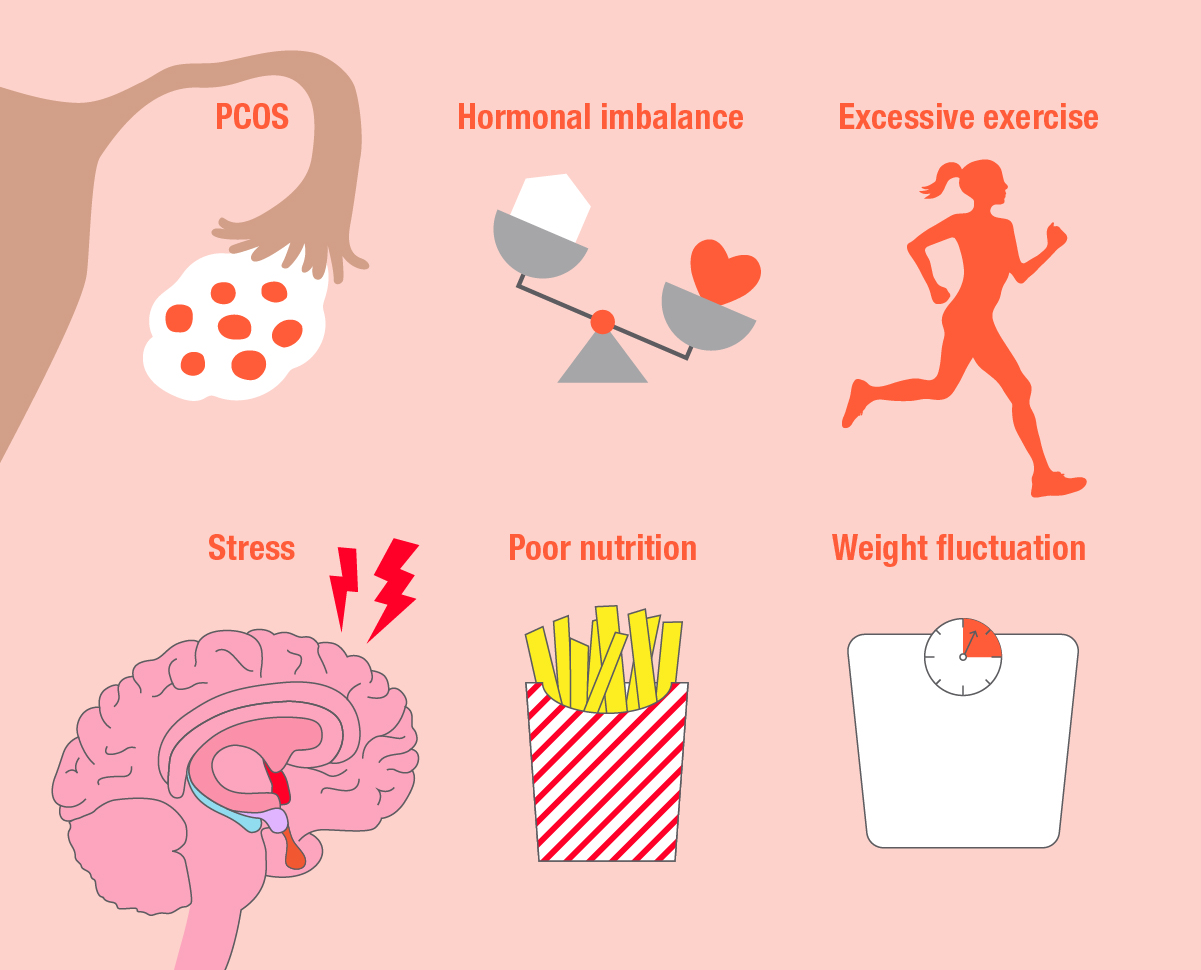Irregular periods are characterized by menstrual cycles that differ in duration, frequency, or intensity. Generally, a menstrual cycle lasts between 21 and 35 days, with the majority of women having a cycle of approximately 28 days. When periods fluctuate substantially from this norm, they are classified as irregular.
What causes irregular periods?

Irregular periods refer to menstrual cycles that differ in length, frequency, or flow. Typically, a menstrual cycle lasts between 21 to 35 days, with many women experiencing an average cycle of about 28 days. When the timing or characteristics of the periods vary greatly from this norm, they are considered irregular.
Various factors can contribute to irregular periods, including:
- Hormonal Imbalance: Variations in hormones such as estrogen and progesterone can influence the consistency of the menstrual cycle.
- Stress: Elevated stress levels can disrupt the hormonal equilibrium, resulting in irregular cycles.
- Weight Fluctuations: Significant weight changes, whether loss or gain, can affect menstrual regularity. Conditions such as polycystic ovary syndrome (PCOS) are often linked to weight changes and irregular cycles.
- Health Issues: Medical conditions that impact the reproductive system or hormone levels, such as thyroid disorders or uterine fibroids, can also cause irregular periods.
What symptoms to look out for irregular periods?

When experiencing irregular periods, it’s important to look out for the following symptoms:
- Changes in Cycle Length: Your menstrual cycle may become shorter than the usual 21 days or longer than 35 days.
- Missed Periods: If you miss one or more periods, it could indicate irregularity.
- Heavy or Light Bleeding: Changes in menstrual flow, including unusually heavy or light bleeding, can be a sign.
- Spotting: Light bleeding or spotting between periods can occur.
- Pain or Discomfort: Increased menstrual cramps or pelvic pain may accompany irregular periods.
- Mood Changes: Hormonal fluctuations can lead to mood swings or changes in emotional well-being.
- Changes in Qualities of Period: Unusual characteristics, such as changes in the color or consistency of menstrual blood.
If you notice any of these symptoms, especially if they persist, it’s a good idea to consult a healthcare professional for further evaluation and guidance.
How do I know when I’m fertile if my period is irregular?
Irregular periods can have a significant impact on fertility due to several factors such as:
Ovulation Issues: Irregular menstrual cycles often mean that ovulation may not occur regularly. If you’re not ovulating, it can be challenging to conceive.
Hormonal Imbalances: Conditions that cause irregular periods, like polycystic ovary syndrome (PCOS) or thyroid disorders, can lead to hormonal imbalances that affect both ovulation and the reproductive system.
Timing of Intercourse: With irregular cycles, predicting the optimal time for intercourse to maximize chances of conception can be difficult, making it harder to become pregnant.
Uterine Health: Irregular periods may impact the uterine lining’s ability to prepare for implantation of a fertilized egg, potentially affecting the chances of successful pregnancy.
Long-term Health Issues: Some underlying conditions causing irregular periods can also have broader implications for reproductive health, affecting egg quality and overall fertility.
If you’re experiencing irregular periods and are concerned about your fertility, it’s advisable to consult a healthcare provider. They can help identify any underlying issues and suggest possible treatment options.
Advice from ZIVA Fertility clinics on Steps to take to regularise irregular periods to maintain fertility

We at ZIVA fertility clinics will start by discussing your menstrual irregularities to help identify any underlying issues and recommend appropriate treatments. Other key suggestions from ZIVA fertility clinics are:
- Track Your Cycle: Keep a journal of your menstrual cycle, including cycle length, flow, and any symptoms you experience. This information can be helpful for your doctor.
- Maintain a Healthy Weight: Being either underweight or overweight can affect your menstrual cycle. Aim for a balanced diet and regular exercise to maintain a healthy weight.
- Manage Stress: High-stress levels can disrupt hormonal balance. Consider stress-reduction techniques such as yoga, meditation, or deep-breathing exercises.
- Stay Active: Regular physical activity can help regulate your menstrual cycle. Aim for a mix of cardio, strength training, and flexibility exercises.
- Nutrition: Focus on a balanced diet rich in whole foods, including fruits, vegetables, whole grains, lean proteins, and healthy fats. Nutritional deficiencies can impact hormonal balance.
- Avoid Excessive Alcohol and Smoking: Both can interfere with hormonal balance and overall reproductive health.
- Consider Supplements: Some women find that supplements like vitamin D, omega-3 fatty acids, and inositol can help with cycle regularity. Always consult your doctor before starting any supplements.
- Medications or Hormonal Therapy: Your doctor may recommend birth control pills or other hormonal therapies to help regulate your cycle, especially if your irregular periods are due to hormonal imbalance.
- Monitor Underlying Conditions: If you have conditions like PCOS or thyroid disorders, ensure they are being monitored and managed effectively.
Implementing these steps can help improve cycle regularity and support fertility, but it’s essential to work closely with us to determine the best approach for your specific situation.When you visit ZIVA Fertility center for a fertility consultation, we always ask for your period regularity. We always counsel our female patients about the best ways to maintain their period health. For more information, please visit our website https://zivafertility.com/ or contact us at +91-9100002737 or +91-9347406900.
















